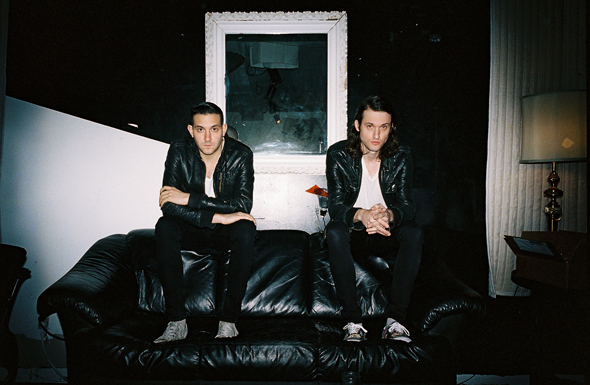Holy Ghost! appearances around North America over spring and summer are selling out at a pleasantly quick rate. Holy Ghost! is not a reference to the divine entity paired with an element of surprise, but to the New York City-based duo of Alex Frankel and Nick Millhiser. It has been a couple of years since the release of the two’s self-titled debut. Its follow-up, Dynamics, is not slotted for a release until a few months down the line. Frankel and Millhiser—along with the four other musicians on stage, the majority of whom are playing keyboards—are using these tour dates as a way of rehearsing their new material live, as it were.

“The songs are really difficult to play live,” admits Millhiser speaking from his home in Williamsburg. “It takes us a while to get into the groove of playing live. This is a good way for us to get comfortable playing the songs. We didn’t want to go out and play the songs for the first time right when the record came out. These are test rehearsals—in front of thousands of people at the Sasquatch Festival.”
Millhiser and Frankel are self-contained on Dynamics, including production (with help from engineer Chris Zane) at the DFA studios housed at their label, headed by LCD Soundsystem’s James Murphy. Unlike Holy Ghost! which had a star-studded guest list of collaborators: the Rapture’s Luke Jenner, Penguin Prison’s Chris Glover, and the Doobie Brothers’ Michael McDonald, Dynamics only has outside input if a labelmate was passing through and offered suggestions: Juan MacLean on drums or LCD Soundsystem’s Nancy Whang on backing vocals.
“We’ve never not done something in the studio because it seems it will be complicated to do live,” says Millhiser. “We struggled through the first 75% of the first album then the last few songs went really quickly. As soon as we finished we were able to see the forest for the trees in terms of the things we wish we’d done. We’d been working on those songs for so long, we were bored of them and eager to start again. We went into Dynamics clearly stating: we’re not going to make the same record again.”
“Before, everything we recorded was a hurdle,” concurs Frankel perched on a stoop on Stonewall Place in the West Village. “We recorded many versions of a song before it sounded right. Now it doesn’t take three days to get the drum sound, it takes two hours. We’re by no means the best producers but we’ve learned how to fine-tune our recording abilities so we distill what we do and it’s allowed us to get into the root of things. A lot of the music we love, karaoke songs, party songs, is simple. To varying degrees the lyrics sound like they were written by 13-year-olds. There’s a way to say a lot with less. That’s what we tried to do: be more minimalist with the approach.”
Prior to Holy Ghost! Frankel and Millhiser had established their Phoenix-from-the-‘80s or New Order-for-the-millenium sound through a slew of high profile remixes (Moby, MGMT, Cut Copy, N.E.R.D., Unkle). This brought them regular DJ dates, which they have been known to go back to when there is call for it—and as a way to pay bills in between albums. These days, however, the duo are feeling increasingly disconnected with EDM’s takeover of underground dance music.
“We really connect to groove-based music,” says Frankel, “But dance culture now is a culture of kids saying they’re at a concert and putting it on Instagram, Facebook, and tagging their friends. It has to do with lifestyle, branding, and marketing, not much with music. I equate the general culture to hair metal. If we’re going by BPM, Diplo would be Slayer—I’m sure he would take that as a compliment, and he should. It’s all show. The crowd knows that and they don’t care. It’s fine, but it’s not where I come from and what I want from music.”
Besides being a decent way to keep the lights on, DJing is also a good way for Holy Ghost! to test unreleased material by crowd reaction, plus looking for records and discovering old and new music keeps the two musically refreshed.
“When we were making the first record it was a pretty exciting time for modern dance music,” says Millhiser. “We’re naturally competitive. For example, if we heard a great track, we’d be like, we should be able to do something better than this—who knows if we could or not. On Dynamics, we are not making many modern dance music references.”
“The biggest problem with dance music now is it is too heterosexual,” states Frankel. “It is a macho, bro culture thing. I am heterosexual, but I don’t like my music to be so heterosexual.”
Text by Lily Moayeri
Photography by Harry McNally

